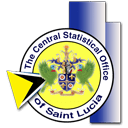TOR Consultancy Services for the Development of ICT Policy
Terms of Reference
Consultancy Services for the Development of ICT Policy for the Central Statistical Office of Saint Lucia Organization of the Eastern Caribbean States (OECS) Data for Decision Making Project
| Title: | Development of ICT Policy for the Central Statistical Office of Saint Lucia | |
| Location: | Saint Lucia Central Statistical Office, The Ministry of Finance, Economic Development and Youth Economy | |
| Tentative Date: | Start | 1 March 2024 |
I. BACKGROUND
The Central Statistical Office of St. Lucia (CSO) is currently engaging in on-going actions to develop and sustain a National Statistical System (NSS). One important step in this initiative is a final strategy for the Development of Statistics in Saint Lucia (National Strategy for the Development of Statistics (NSDS)), which would provide the framework for strengthening statistical capacity across the NSS as well as establish the vision and outline milestones to monitor the various stages of progress in the medium to long-term. The CSO has engaged the support and assistance of several development partners in the strategic planning process. Through the World Bank/OECD initiative, Saint Lucia undertook to develop a NSDS intended to promote greater coordination and cooperation in statistics, therefore increasing efficiency, and helping to bring the statistics supply more in line with demand.
As part of the development of the NSDS and strengthening of the NSS, the goal is to construct a robust
Information and Communication Technology (ICT) policy document aligned with the CSO’s Mission and
Vision and enhance the department’s ability to produce high-quality, reliable statistics that support evidence-based decision-making and meet the needs of stakeholders and decision-makers. Such a policy must support the effective utilization and management of resources while facilitating the use of the latest statistical techniques and innovative technologies to achieve the statistical objective, bearing in mind the internal and external organizational context within which the same exists. Notably, ICT policymaking is not only about the best technical/scientific response to an issue; it is primarily about the best technical solution acceptable to all (or majority of the) stakeholders. This process requires the identification of a suitable ICT development model, assessment of current laws and regulations, and analysis of stakeholders.
The ICT should not only focus solely on technology, but also, on the people within the organization, the organizational culture and the cultivating of best practices and skillsets. The CSO is seeking the services of an ICT consultant with experience in the preparation and development of ICT policies, governance structure and framework that will address the ICT structure gaps that support the CSO operations.
II. SCOPE OF SERVICES
Under the direction of the Project Coordinator and Deputy Project Coordinator, the Consultant will be required to undertake activities as outlined below.
- Conduct a comparative analysis of ICT policies implemented by other statistical agencies, focusing on countries with similar profiles and challenges as well as the Public Sector of Saint Lucia Department of Modernisation;
- Identify strengths, weaknesses, opportunities, and threats related to the existing ICT framework;
- Engage with key stakeholders within the CSO to understand their specific ICT needs and challenges;
- Identify international best practices and standards in ICT policies for statistical organizations including identification of best practices, like what obtains at the Government of Saint Lucia Division of Modernisation.
- Draft a comprehensive ICT policy document tailored to the specific needs and goals of the Saint Lucia CSO that is aligned to the Government of Saint Lucia Division of Modernisation ICT’s policy
- Ensure the policy addresses key areas such as data security, network infrastructure, software usage, disaster recovery, and user access controls;
- Clearly outline roles and responsibilities for the implementation and enforcement of the policy,
- Provide practical and actionable recommendations for the phased implementation of the ICT policy;
- Suggest key performance indicators (KPIs) and metrics for monitoring and evaluating the effectiveness of the policy.
III. QUALIFICATIONS AND EXPERIENCE
- Bachelor’s Degree in Computer Science, Computer Information Systems, Information Systems Management, Information Technology or a related field;
- At least five years’ experience in in the area of ICT governance;
- Conducted at least 2 similar assignments to government ministries and agencies, or international donor agencies or regional agencies;
- Demonstrated experience in at least 2 similar assignments involving conceptualization, definition, design and implementation of ICT Governance/Standards;
- Demonstrated experience in at least 2 similar assignments involving conceptualization, definition, design and implementation of ICT architectures;
- Familiarity with the context and challenges of statistical offices in small island nations is an asset.
IV. WORKING ARRANGEMENTS
The Consultant will work closely with the technical staff of the CSO.
V. DELIVERABLES
The consultant is expected to deliver the following:
- Inception Report detailing the proposed approach, methodology, and work plan;
- Draft and Final Report of ICT policies assessment conducted including ) comparative analysis of ICT policies implemented by other statistical agencies, focusing on countries with similar profiles and challenges as well as the Public Sector of Saint Lucia Department of Modernisation, ii) strengths, weaknesses, opportunities, and threats related to the existing ICT framework, advice and recommendations in line with best practices and standards in ICT policies for statistical organizations and, like what obtains at the Government of Saint Lucia Division of Modernisation;
- Draft implementation plan with detailed recommendations for phased execution, specification of roles and responsibilities for the implementation and enforcement of the policy, as well as KPIs and metrics for monitoring and evaluating the effectiveness of the policy;
- Finalized ICT Policy document and implementation plan, incorporating feedback from stakeholders.
VI. DELIVERABLES AND PAYMENT SCHEDULE:
| Deliverables
|
Estimated Timelines (Working days after the signing of the contract) | Proposed Payment schedule |
| 1. Inception report outlining approach to the assignment, methodology and work plan |
7 days |
10% |
| 2. Draft assessment conducted including advise and recommendations for
best practices |
15 days | 25% |
| 3. Draft policy document and implementation plan with detailed recommendations for phased execution, specification of roles and
responsibilities for the implementation and enforcement of the policy, as well as KPIs and metrics for monitoring and evaluating the effectiveness of the policy |
30 days | 40% |
| 4. Final versions of 2 and 3 above, incorporating feedback from stakeholders. | 20 days | 25% |
VII. SELECTION METHOD
The Consultant will be selected through the “Individual Consultant Selection method” in accordance with the World Bank Procurement Regulations for IPF Borrowers (Procurement Regulations), November 2020.

